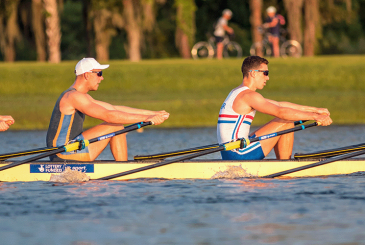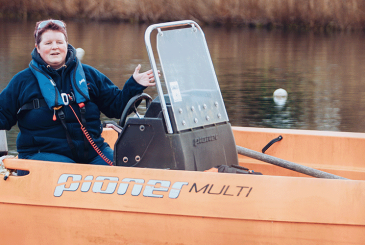Could a more compassionate approach to coaching lead to sustainable success in the long term? Steve O’Connor tells Alan Oldham why developing rowers as people is key
Kindness isn’t the first word that comes to mind when many think of sport. Especially in a technical, physically demanding sport like rowing where results are measured in milliseconds, coaching’s ‘soft skills’ are at best overshadowed by and, at worst, cast in opposition to the ‘hard’ demands of performance.
Yet critics of this popular attitude claim there is nothing mutually exclusive about coaching with kindness and coaching to win. While few would refute that a gentler approach can keep more people in rowing, could it also lead to more sustainable success for those who do aspire to the high performance?
Steve O’Connor thinks so. British Rowing Plus spoke with the founder and CEO of Fulham Reach Boat Club about why he believes that coaching with kindness is in the best interests of all.
Fulham’s reach
Founded in 2014, Fulham Reach Boat Club has lived up to its simple, powerful vision to provide ‘rowing for all’. Central to this is a focus on developing people instead of producing athletes.
Located in the shadow of Hammersmith Bridge along a section of the River Thames that boasts Cambridge and Oxford’s famous Boat Races, Fulham’s open-door approach has put rowing within reach of thousands in the surrounding community for the first time.
“Before the pandemic we had about 1,300 children a year from 14 local state schools,” said O’Connor. Fulham Reach also runs specialised projects like the innovative Boats not Bars to reduce reoffending rates of ex-prisoners, and the Holiday Hunger project.
“There are six weeks during the holidays where the state does not support meals for students,” he explained. “We saw a chance to do something, so we do rowing and provide lunch through the holidays.”
Testing the limits
It was during a Holiday Hunger session where O’Connor’s resolve for compassionate coaching was really tested.
“We were on land after a session when suddenly we heard a large commotion. I went in and the changing room was a wreck. Two boys were covered in shaving foam. They looked at me and said: ‘wasn’t me’. I said, ‘well, it has to be one of you.’”
O’Connor counted to ten in his head and gave a more measured response: “Look, clean it up and then you can get going.”
“That incident showed me that the sport made a massive difference to this young person”
For all his calmness, tensions continued rising: one boy started swearing at O’Connor. “So, I said, ‘Look, just get out of here’. On the way out, I made sure he knew that we weren’t kicking him out of the course, as long as he came back the next day and apologised.”
The boy left, swearing.
“It really upset me that night,” reflected O’Connor. “There was clearly a back story. It turns out this guy had been to six different schools and in foster care. His life had not been good. He had messed up at rowing, but he didn’t know how to deal with his emotions and wasn’t used to boundaries.”
O’Connor was convinced he wouldn’t be back.
“But the next day, he did come,” said O’Connor. “He came and said, ‘look, I’m really sorry’. I had a speech ready, but just said, ‘right, let’s go’. He turned into a model athlete and at the end of the day actually helped tidy up.
“As a coach, you have to get into your athletes’ shoes. That incident showed me that the sport made a massive difference to this young person. For the first time he had a boundary. When he stepped out of line he learned how to step back in and keep going.”
Coaching the coaches
For O’Connor, risk management and communication are good coaching’s fundamentals. “We do surprisingly little [coach training] on how to put the blade in the water and draw it out,” he said. “That’s the easy stuff.
“You have to be able to say the same thing multiple ways, so lots of people can receive it. To me that is good coaching, someone who is an awesome communicator. Prioritising those skills makes the coaching relationship work.”
O’Connor acknowledged that not having winning as the main marker of success is difficult for some coaches.
By letting go of a win-at-all-cost mentality, you create an atmosphere that develops more winners
“At the beginning we had coaches who secretly wanted to focus on performance,” he said. “They were signing on to our stated approach, but tried to turn their athletes into Olympians. Over time we have had to be really clear with people talking about coaching with us that this is grass roots.”
For all that, O’Connor is no opponent to performance training. “Just understand your audience,” he said. “Not everybody you coach wants the same stuff. You have to coach them to what they want to achieve. If you want to win stuff and they don’t, it doesn’t work.”
“This does not mean bending the training to the athlete’s will,” O’Connor added, referencing how these principles apply inside performance programmes. “The coach knows best about technique, how to move the boat quickly. But the coach needs to be more like a psychologist, understanding individual motivations. Coaching is starting to move in this direction.”
Why does kindness matter?
Finally, for coaches or rowers whose interest in rowing is exclusively motivated by winning, it may be time to re-examine how best to get there.
“By focusing not on results but why rowers are there, not only can you still get wins, but you can get wins over a longer time,” said O’Connor, who points out the paradox that by letting go of a win-at-all-cost mentality, “you create an atmosphere that develops more winners.”
“It’s just the right thing to do,” concluded O’Connor on why kindness matters. “When you are kind, people will go on and be kind to others. It will spread and create the kind of world we want to live in.
“When we all care for each other, we all understand why we are here. We can still get the results we want in life, whether it is on or off the water. You can be stern and direct with people, but you can do it with love, with kindness.”
Photo: Fulham Reach Boat Club










